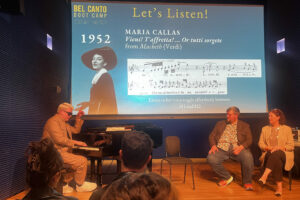

Perhaps Zhang could be let off the hook as Semele is not really an opera but an oratorio although it is often staged. But its story is mythic rather than sacred: the ambitious daughter of the King of Thebes pursues an affair with the god Jupiter which results in her immolation. Yet she achieves the immortality she sought via her son the god Dionysus who is rescued while still a fetus by his omnipotent father.
Having abandoned Italian opera in 1741 Handel turned exclusively to English music dramas intended for the concert platform. Semele’s libretto stems from one written in 1707 by the famed playwright William Congreve for composer John Eccles whose own Semele mysteriously never reached the stage until 1972. A performance at The Juilliard School in 2002 revealed it to be a pallid piece. However, Handel’s version, completed in just over a month during 1743, revels in the high wit and lovely poetry of the text (bolstered by additions from other works by Congreve) and has been performed many times since its mid-20th century rediscovery, as has the composer’s other mythic oratorio—Hercules.
Much has been made of this Semele’s setting—a 17-ton, 450-year-old Ming Dynasty temple reassembled on the BAM stage. In fact, many of the directorial “intrusions” wrought by Zhang stem from this temple. During the overture a silent, subtitled black-and-white film is screened showing the structure being taken down for transport to the artist’s studio while the building’s recent sad history is recounted. At the evening’s conclusion, after Handel’s music ends, the chorus hums a Communist anthem while another black-and-white video shows a driving rain slowly obliterating the portrait of an adulterous wife (a Semele parallel?) whose diary was found in the temple.

Musically, too, this was a conservative performance featuring the Toronto company’s 28-member chorus and modern-instrument orchestra (abetted by harpsichord, organ and archlute). Conductor Christopher Moulds elicited measured playing from his fine band—stylish, but unexciting. The game chorus was hearty but lacked the desired finesse for Handel’s complex writing; they made their best showing in the demanding “Now Love that everlasting boy invites” all the while competing with the randy donkey.
The cast, much changed from the 2012 Toronto run of this production, did a particularly fine job in putting across Congreve’s delicious text with point and exemplary clarity: the titles above the stage were rarely needed. Perhaps to keep the running time to around three hours, there were substantial cuts, including the redemptive final scene where Apollo announces the future birth of Bacchus (Dionysus). Semele lost her charming “The morning lark” but the most damage was done to the subplot concerning Semele’s shy sister Ino and her love for Semele’s fiancé Athamas.

The florid music for Jupiter also defeated tenor Colin Ainsworth whose “I must with speed amuse her” was a mess. Happily he recovered quickly for his following aria, the celebrated “Where’er you walk,” which he floated beautifully. His flustered, affable portrayal was winning but lacked the strutting authority one expected from the Father of Gods.
Kyle Ketelsen revealed a notable bass-baritone as both Semele’s father Cadmus and Somnus, the god of sleep. Unfortunately the usually sure-fire scene of Juno waking up the dozing god fell flat due to the awkward placement of Ketelsen on the roof of the temple seated next to a large inflatable doll. Throughout, one wondered why this fine singer appears so rarely in New York. As the Juno’s perky messenger Iris, soprano Katherine Whyte was a bit too shrill.
Happily, Jane Archibald’s Semele proved to be the evening’s greatest asset. While others have emphasized the character’s conniving ambition, she nearly made one believe that Semele was really in love with Jupiter. She bravely floated above the stage (on wires) in front of a full moon while tossing off “Endless pleasures” and dutifully rolled about the stage showing lots of leg while seducing the besotted god. The glittering coloratura flourishes of “Myself I shall adore” (strikingly sung in front of an enormous mirror) and “No, no! I’ll take no less”—both supplemented by some extravagant ornaments–held no terrors for her but her most impressive moments were the least showy. The well-known “O sleep, why dost thou leave me?” was ravishingly spun out with a rosy, pearly tone, as was the equally bewitching “My racking thoughts.”
Zhang’s much-vaunted operatic “innocence” caused far less havoc than one might have feared and despite his occasional intrusive eccentricities BAM and the Canadian Opera Company treated an engaged audience to an involving Semele.
Photos: Jack Vartoogian/Frontrowphotos


























Comments